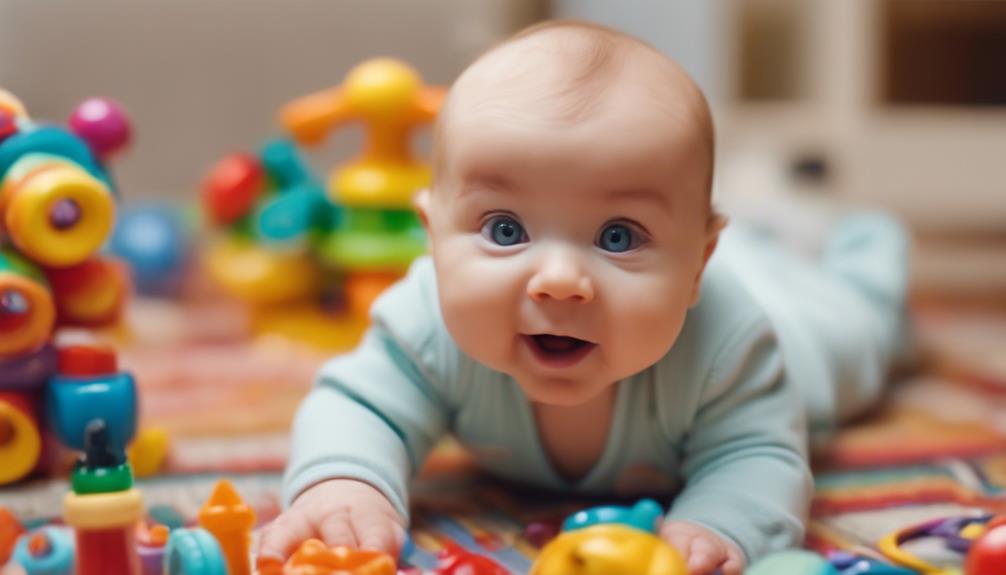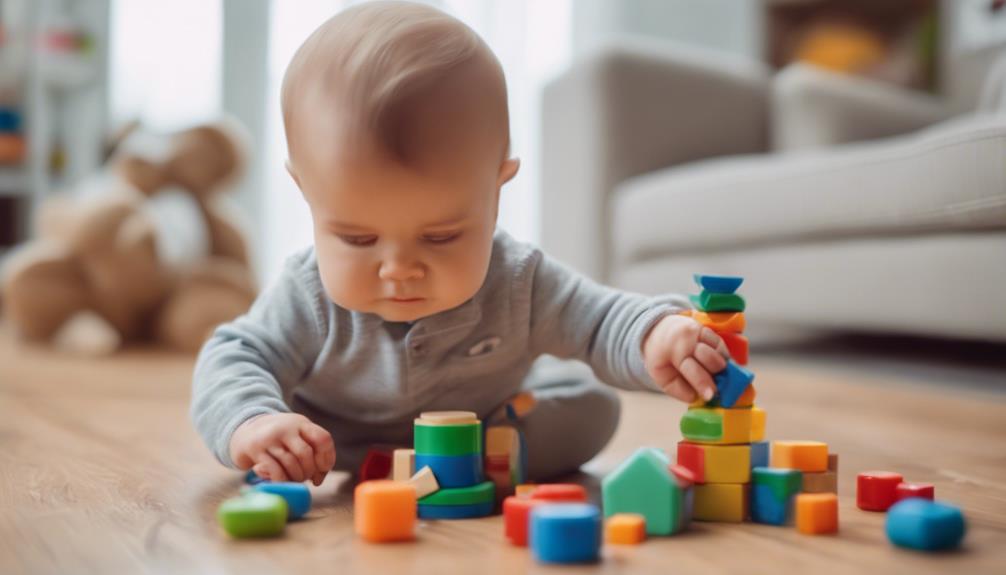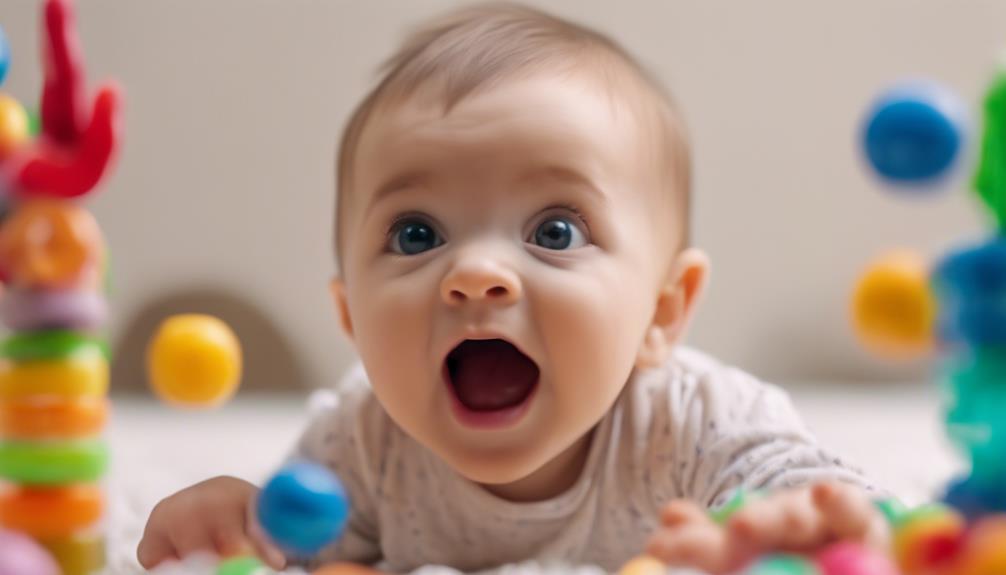Babies who start talking early often demonstrate exceptional intelligence in communication and cognitive skills, outperforming their peers in language development and problem-solving abilities. To enhance your baby’s intelligence, participate in interactive play to promote bonding, develop social skills, and improve cognitive growth. Encouraging babbling and gestures aids in early language development, strengthens the parent-child relationship, and boosts confidence. Creating an environment rich in language stimulates brain development, improves communication skills, and fosters curiosity. These tips establish a strong foundation for your baby’s cognitive and language development, paving the way for ongoing growth and learning.
Key Takeaways
- Early talking babies show exceptional intelligence in communication skills.
- Advanced cognitive abilities demonstrated through early babbling.
- Interactive play and reading routines are crucial for language development.
- Creating a language-rich environment stimulates cognitive growth.
- Encouraging exploration and problem-solving boosts baby intelligence.
Signs of Early Talking Baby Intelligence
Early talking babies often display clear signs of exceptional intelligence in their communication and language skills. When your little one starts babbling and forming words earlier than expected, it could be an indicator of advanced cognitive abilities.
These early talking babies show remarkable proficiency in expressing themselves and grasping language nuances at a rapid pace. Their language development tends to be more advanced compared to their peers, hitting milestones ahead of schedule.
Alongside their communication skills, these exceptional babies demonstrate heightened cognitive abilities like problem-solving, imaginative thinking, and strong memory retention. Their keen focus, ability to recognize faces, and maintain eye contact with caregivers further underscore their advanced cognitive capabilities.
It's fascinating how physical factors such as high birth weight and height can also contribute to better academic performance in these bright young minds. Keep nurturing and encouraging your early talking baby's language skills and cognitive growth to support their exceptional intelligence.
Cognitive Stimulation for Baby Intelligence
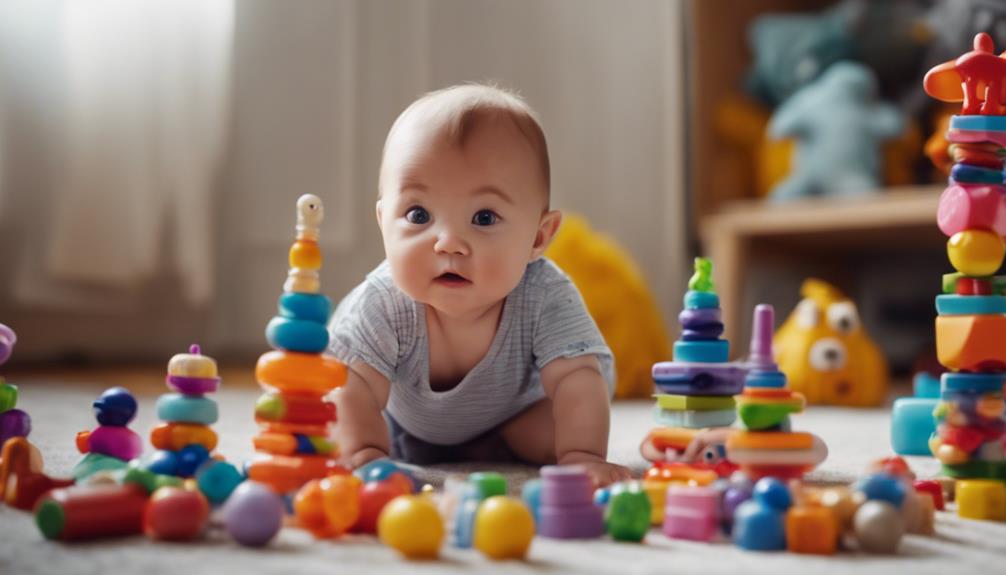
Stimulate your baby's cognitive development by incorporating various interactive activities and experiences into their daily routine. Hearing different languages from an early age can enhance cognitive abilities, so try exposing your baby to multilingual environments.
Opt for interactive toys that encourage exploration to boost problem-solving skills. Make chores like clean-up time a part of their routine to promote cognitive development through practical challenges.
Providing a range of sensory experiences, such as textures, sounds, and visuals, can further enrich your baby's cognitive growth. Engage in activities that foster curiosity and exploration, as these can stimulate intellectual development.
Encouraging Language Development in Babies
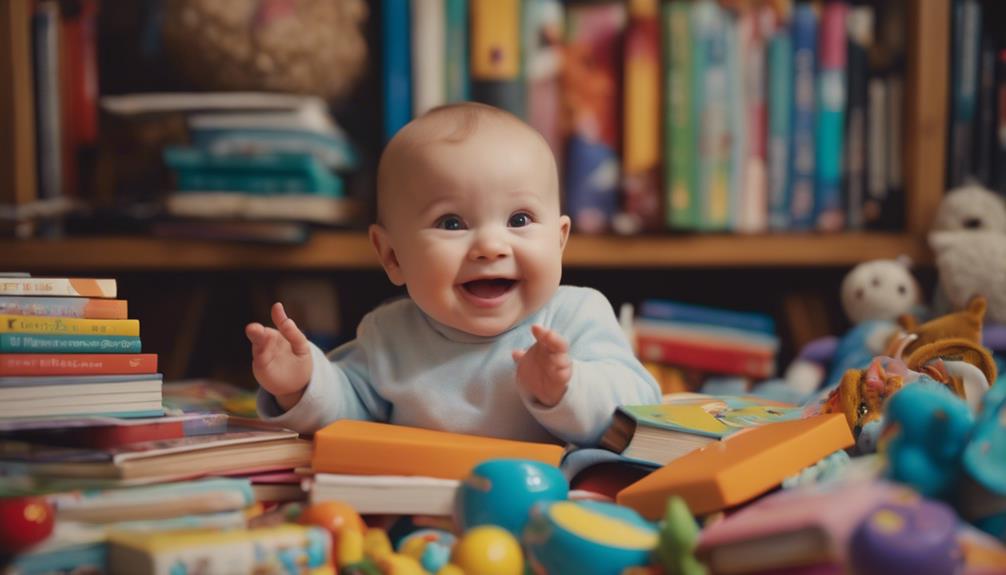
To encourage language development in babies, engaging in interactive play and establishing daily reading routines are crucial.
By incorporating interactive toys and engaging in activities that promote language skills, you can create a language-rich environment that supports their cognitive growth.
These practices play a significant role in fostering early communication abilities and setting the stage for academic success in the future.
Interactive Play for Language
Engage in interactive play to foster language development in your baby by encouraging communication skills through fun and engaging activities. Interactive play is an essential component in creating a language-rich environment that stimulates your baby's cognitive growth. By incorporating back-and-forth interactions during playtime, you can support the development of conversational skills in your little one. Activities like peek-a-boo, singing songs, and playing with toys not only entertain your baby but also encourage them to make sounds and interact with you, helping them learn new words, gestures, and expressions. Below is a table highlighting the benefits of interactive play for language development:
| Benefits of Interactive Play for Language Development |
|---|
| Promotes communication skills |
| Encourages back-and-forth interactions |
| Fosters early language development |
| Supports conversational skills |
| Stimulates cognitive growth |
Daily Reading Routines
Encouraging language development in babies through daily reading routines can greatly contribute to their cognitive growth and early literacy skills. Reading to your baby on a regular basis is a simple yet powerful way to enhance their language skills and stimulate their cognitive abilities.
By establishing a routine of reading, you not only promote early literacy but also instill a love for books in your little one. Babies exposed to reading early on tend to develop larger vocabularies and better communication skills, setting a strong foundation for future learning.
Engaging in interactive reading sessions with your baby is key to encouraging language acquisition and fostering brain development. These sessions not only enhance listening skills but also spark imagination, contributing to overall cognitive growth.
Building Trust for Cognitive Development

Establishing a strong foundation of trust is essential for fostering cognitive development in your baby. Trust plays a critical role in shaping your baby's brain development and emotional well-being.
Here are three key points to contemplate:
- Responsive Caregiving: By promptly meeting your baby's needs and responding to their cues, you build a sense of security and trust. This responsive approach lays the groundwork for healthy cognitive development.
- Emotional Regulation: Trust helps your baby regulate their emotions, leading to better stress management and improved focus. A secure attachment through trust enables your baby to navigate their feelings effectively.
- Parent-Child Relationship: Building trust nurtures a positive bond between you and your baby, enhancing their social and cognitive skills. A strong parent-child relationship rooted in trust promotes a supportive environment for your baby's overall development.
Invest in trust-building activities to create a solid foundation for your baby's cognitive growth.
Tips for Boosting Baby's Intelligence
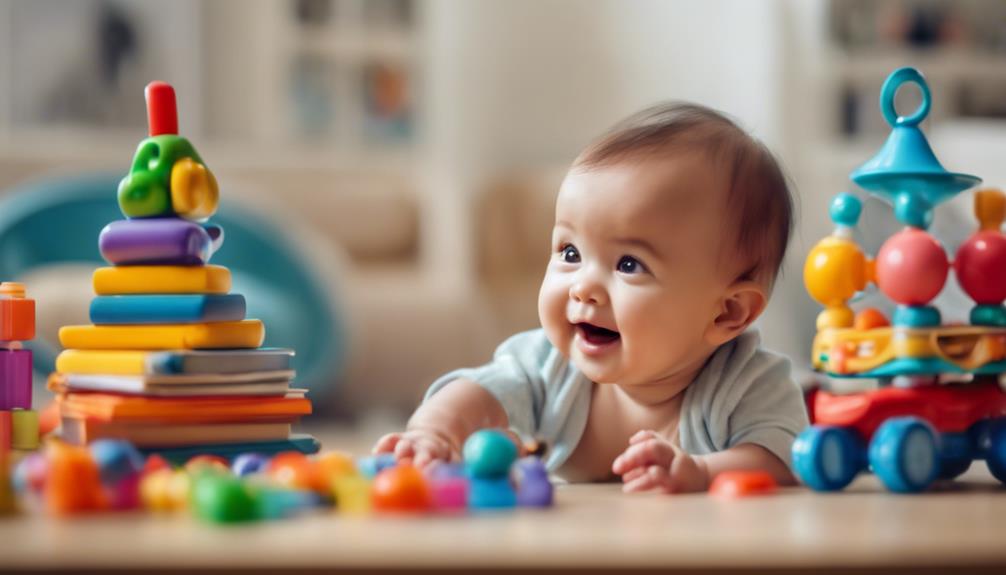
To boost your baby's intelligence, engage in stimulating play activities that encourage exploration and problem-solving. Reading books together and interacting with diverse vocabulary can also enhance cognitive skills and language development.
Stimulating Play Activities
Engage your baby in interactive play activities like peek-a-boo to boost their intelligence and cognitive development. Interactive play not only entertains your little one but also plays an essential role in making your baby smart.
Here are some stimulating play activities to enhance your baby's development:
- Sensory Play: Encourage exploration of different textures and shapes through sensory play. This type of play helps in stimulating your baby's senses and promoting sensory development.
- Problem-Solving Skills: Utilize stacking blocks or nesting cups to challenge your baby's problem-solving skills and enhance spatial awareness. These activities are great for developing critical thinking abilities.
- Fine Motor Skills: Introduce simple puzzles or shape sorters to aid in the development of your baby's fine motor skills. These activities help in refining hand-eye coordination and cognitive abilities.
Reading and Interaction
Reading and interacting with your baby regularly can greatly enhance their intelligence and cognitive development. Reading to your baby not only supports their language development but also boosts their cognitive skills. Interactive conversations aid in building vocabulary and understanding of language. Engaging in activities like singing songs and playing games can stimulate your baby's brain development. Providing a language-rich environment at home encourages your baby to communicate and express themselves effectively. Responding to your baby's cues and gestures during interactions fosters their emotional intelligence and communication skills.
| Benefits of Reading and Interaction for Baby's Development |
|---|
| Enhanced language development |
| Improved cognitive skills |
| Expanded vocabulary |
Enhancing Baby's Communication Skills

Enhancing your baby's communication skills can be achieved through simple yet impactful activities like reading, talking, and singing. To help your baby develop strong communication skills, consider the following:
- Engage in Interactive Play:
Interactive play not only fosters bonding but also helps babies learn how to communicate effectively through gestures and actions.
- Respond to Babbling and Gestures:
By responding to your baby's babbling and gestures, you're encouraging them to continue communicating, which is essential for their early language development.
- Create a Language-Rich Environment:
Surround your baby with varied stimuli such as books, music, and conversations. This language-rich environment stimulates their brain development and enhances their ability to understand and use language effectively.
Frequently Asked Questions
Do Intelligent Babies Talk Earlier?
Yes, intelligent babies often talk earlier than others. Their advanced language skills may show as early as 9 months, with vocabularies exceeding 100 words by 18 months. By age 2, they can form fuller sentences.
How Early Can You Tell if a Baby Is Smart?
You can tell if a baby is smart early on by observing their communication skills, problem-solving abilities, and memory retention. Look for signs like reaching milestones ahead of others, strong eye contact, and recognizing faces.
Does Early Talking Mean Higher Intelligence?
Early talking in babies does not necessarily mean higher intelligence. While it can showcase advanced language skills, intelligence encompasses various cognitive abilities. Remember, early speech development is just one aspect of a child's overall potential intelligence.
How Do You Know if Your Baby Is Talking Early?
Listen closely to your baby's babbling. When they start forming words around 9-12 months, pay attention to consistent word usage and their ability to communicate needs. Celebrate their early talking milestones with encouragement and praise.
How to Identify a High IQ Baby?
To identify a high IQ baby, observe early signs like advanced language skills, quick learning, and problem-solving abilities. Look for a strong memory, curiosity, and rapid development milestones. These traits may indicate giftedness and potential for academic success.
Conclusion
In nurturing your early talking baby's intelligence, you're planting the seeds for a flourishing garden of knowledge.
Just as a skilled gardener tends to their plants with care and attention, so too must you nurture your little one's cognitive development.
Through cognitive stimulation, language encouragement, trust building, and communication enhancement, you're laying the foundation for a bright and brilliant future.
Keep fostering their growth with love and dedication, and watch their intelligence bloom.

